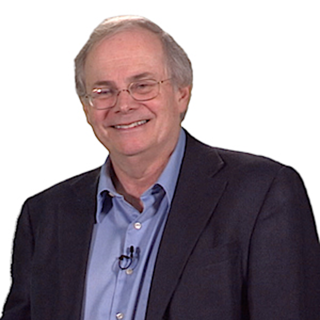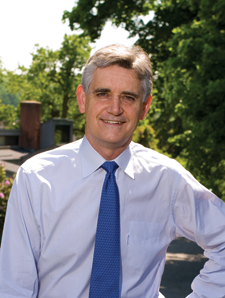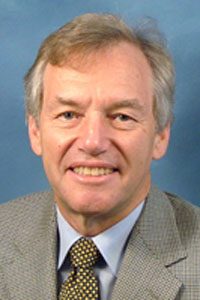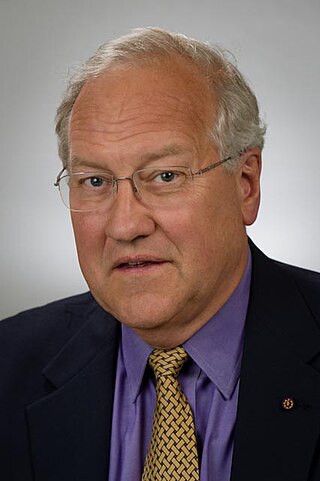Related Research Articles

Carlos José Bustamante is a Peruvian-American scientist. He is a member of the National Academy of Sciences.

Miguel José Yacamán is a Mexican physicist who has made contributions to the fields of materials science, nanotechnology, and physics.

The Joan & Sanford I. Weill Medical College of Cornell University is Cornell University's biomedical research unit and medical school in New York City. It is affiliated with NewYork-Presbyterian Hospital, Weill Cornell Medical Center, Hospital for Special Surgery, Memorial Sloan Kettering Cancer Center, and Rockefeller University, all of which are located nearby on York Avenue.

Gregory A. Petsko is an American biochemist and member of the National Academy of Sciences, the National Academy of Medicine, the American Academy of Arts and Sciences, and the American Philosophical Society. He is currently Professor of Neurology at the Ann Romney Center for Neurologic Diseases at Harvard Medical School and Brigham and Women's Hospital. He formerly had an endowed professorship in Neurology and Neuroscience at Weill Cornell Medical College and is still an adjunct professor of Biomedical Engineering at Cornell University, and is also the Gyula and Katica Tauber Professor, Emeritus, in biochemistry and chemistry at Brandeis University.
Aaron Victor Cicourel, who is professor emeritus of sociology at the University of California, San Diego, specializes in sociolinguistics, medical communication, decision-making, and child socialization. Early in his career, he was intellectually influenced greatly by Alfred Schutz, Erving Goffman, and Harold Garfinkel.

Raphael Mechoulam is an Israeli organic chemist and professor of Medicinal Chemistry at the Hebrew University of Jerusalem in Israel. Mechoulam is best known for his work in the isolation, structure elucidation and total synthesis of Δ9-tetrahydrocannabinol, the main active principle of cannabis and for the isolation and the identification of the endogenous cannabinoids anandamide from the brain and 2-arachidonoyl glycerol (2-AG) from peripheral organs together with his students, postdocs and collaborators.

Juan Rosai was an Italian-born American physician who contributed to clinical research and education in the specialty of surgical pathology. He was the principal author and editor of a major textbook in that field, and he characterized novel medical conditions such as Rosai-Dorfman disease and the desmoplastic small round cell tumor. Rosai is also well-known because of his role as teacher, mentor and consultant to many American and international surgical pathologists.
Shahrokh François Shariat is currently professor and chairman of the Department of Urology, Medical University of Vienna, Vienna General Hospital, Vienna, Austria. He is also adjunct professor of urology at Weill Cornell Medical Center, New York, NY; adjunct professor of urology at the University of Texas Southwestern Medical Center, Dallas, TX, USA; adjunct professor of urology at the Faculty of Medicine, Charles University, Prague, CZ; adjunct professor of urology at I.M. Sechenov First Moscow State Medical University, Moscow, RU; honorary professor of urology, University of Jordan, Amman, JO; doctor honoris causa, Carol Davila University of Medicine and Pharmacy, Bucharest, RO; and doctor honoris causa, Semmelweis University, Budapest, Hungary. He has published more than 1500 peer-reviewed research papers, more than 600 non-peer-reviewed papers, and 26 book chapters. Shahrokh Shariat specializes in treating urologic malignancies. He has been voted as the most influential urologist in 2020 and also the most cited prostate cancer researcher in the German speaking area.

K. Srinath Reddy is an Indian physician who serves as the president of the Public Health Foundation of India and formerly headed the Department of Cardiology at All India Institute of Medical Sciences (AIIMS).

Bruce William Stillman, AO, FAA, FRS is a biochemist and cancer researcher who has served as the Director of Cold Spring Harbor Laboratory (CSHL) since 1994 and President since 2003. He also served as the Director of its NCI-designated Cancer Center for 25 years from 1992 to 2016. During his leadership, CSHL has been ranked as the No. 1 institution in molecular biology and genetics research by Thomson Reuters. Stillman's research focuses on how chromosomes are duplicated in human cells and in yeast Saccharomyces cerevisiae; the mechanisms that ensure accurate inheritance of genetic material from one generation to the next; and how missteps in this process lead to cancer. For his accomplishments, Stillman has received numerous awards, including the Alfred P. Sloan, Jr. Prize in 2004 and the 2010 Louisa Gross Horwitz Prize, both of which he shared with Thomas J. Kelly of Memorial Sloan-Kettering Cancer Center, as well as the 2019 Canada Gairdner International Award for biomedical research, which he shared with John Diffley.
Robert Edward Gross was an American surgeon and a medical researcher. He performed early work in pediatric heart surgery at Boston Children's Hospital. Gross was president of the American Association for Thoracic Surgery, a member of the National Academy of Sciences and a fellow of the American Academy of Arts and Sciences.

Michael Nip Hall is an American-Swiss molecular biologist and professor at the Biozentrum University of Basel, Switzerland.

Rafael Radi is an Uruguayan biochemist and biomedical scientist that has extensively worked to elucidate molecular mechanisms by which free radicals, oxidants and nitric oxide participate in human pathologies. In particular, he has made relevant contributions to unravel how the signal transducing free radical nitric oxide can evolve into toxic species via the formation of secondary nitric oxide-derived oxidants. His work has characterized reactions of oxidizing species with biological targets, the role of mitochondrial dysfunction is the alterations of cellular redox homeostasis and the impact of these biochemical processes in disease states. He has studied the actions of synthetic compounds in redox-based therapeutics, including in cardiovascular and neurodegenerative diseases. This work has also contributed to understand the redox biology of host cell interactions with intracellular pathogens and the impact in the control of infectious diseases. His seminal paper related to the biochemical actions of peroxynitrite, a potent oxidant and nucleophile formed secondary to the diffusion-controlled reaction of nitric oxide with superoxide radicals together with Joe S. Beckman, Kent Bush and Bruce A. Freeman in 1991 has been selected as a JBC Classics due to its influence in the field.

Martin Richardson is a British-American scientist and Professor of Physics. He is best known for the development of high power lasers, and for their use in understanding laser-induced plasma.

Robert A. Lamb is a British American virologist. He is the Kenneth F. Burgess Professor at Northwestern University and since 1991, and an investigator of the Howard Hughes Medical Institute. From 1990 to 2016, he was the John Evans Professor of Molecular and Cellular Biology at Northwestern University.
Bruce Alan Sullenger is the Joseph W. and Dorothy W. Beard Professor of Experimental Surgery at the Duke University School of Medicine, the Founding Director of the Duke Translational Research Institute (DTRI) which he led from 2006-2016, and the Associate Director for Translation in the Duke Cancer Institute (DCI).
Noel R. Rose, was an American immunologist, pathologist, and molecular microbiologist. He is widely known for pioneering autoimmunity during the 1950s and made several contributions to the field of autoimmunity, which brought in the modern era of research into autoimmune disease. He is often referred to as the "Father of Autoimmunity".

Thomas P. Sakmar is an American physician-scientist and the former acting president of The Rockefeller University. Prior to becoming acting president he was Associate Dean for Graduate Studies in the Tri-Institutional MD–PhD Program.
Sina Y. Rabbany is the Jean Nerken Distinguished Professor of Engineering at Hofstra University, dean of the Fred DeMatteis School of Engineering and Applied Science, founding director of the school's Bioengineering program, and adjunct associate professor of bioengineering at the Weill Cornell Medical College of Cornell University. Under his tenure, the DeMatteis School's fast growth led to the school's planned expansion into a new Science and Innovation Center. His research concerns cellular and tissue engineering of the vascular system and investigates the impact of the biophysical microenvironment on the structure and function of endothelial cells. His research explores the capabilities of endothelial cells to build functional blood vessels and support organ regeneration. His h-index is 28 by Google Scholar.
References
- ↑ "Dr. David P. Hajjar Named to Fulbright Scholars Program". Weill Cornell Medicine. 2011-02-14. Retrieved 2016-07-01.
- ↑ "Dr. David Hajjar Appointed Senior Executive Vice Dean and Executive Vice Provost of Weill Cornell Medical College". Weill Cornell Medicine. 2007-08-14. Retrieved 2016-07-01.
- ↑ "Four elected to American Academy of Arts and Sciences". Weill Cornell Medicine. 2016-04-21. Retrieved 2016-07-01.
- ↑ "UNH Announces 2014 Granite State Award and Honorary Degree Recipients". University of New Hampshire. 2014-04-02. Retrieved 2016-07-01.
- ↑ "Biographies of Fellows". The Belfer Center, Harvard-Kennedy School of Government. 2014-01-01. Retrieved 2016-07-01.
- ↑ "Biographies of Jefferson Science Fellows". The National Academies of Sciences, Engineering, and Medicine. 2015-01-01. Retrieved 2016-07-01.
- ↑ "Biographies of Fellows". The Brookings Institution. 2016-01-01. Retrieved 2016-07-01.